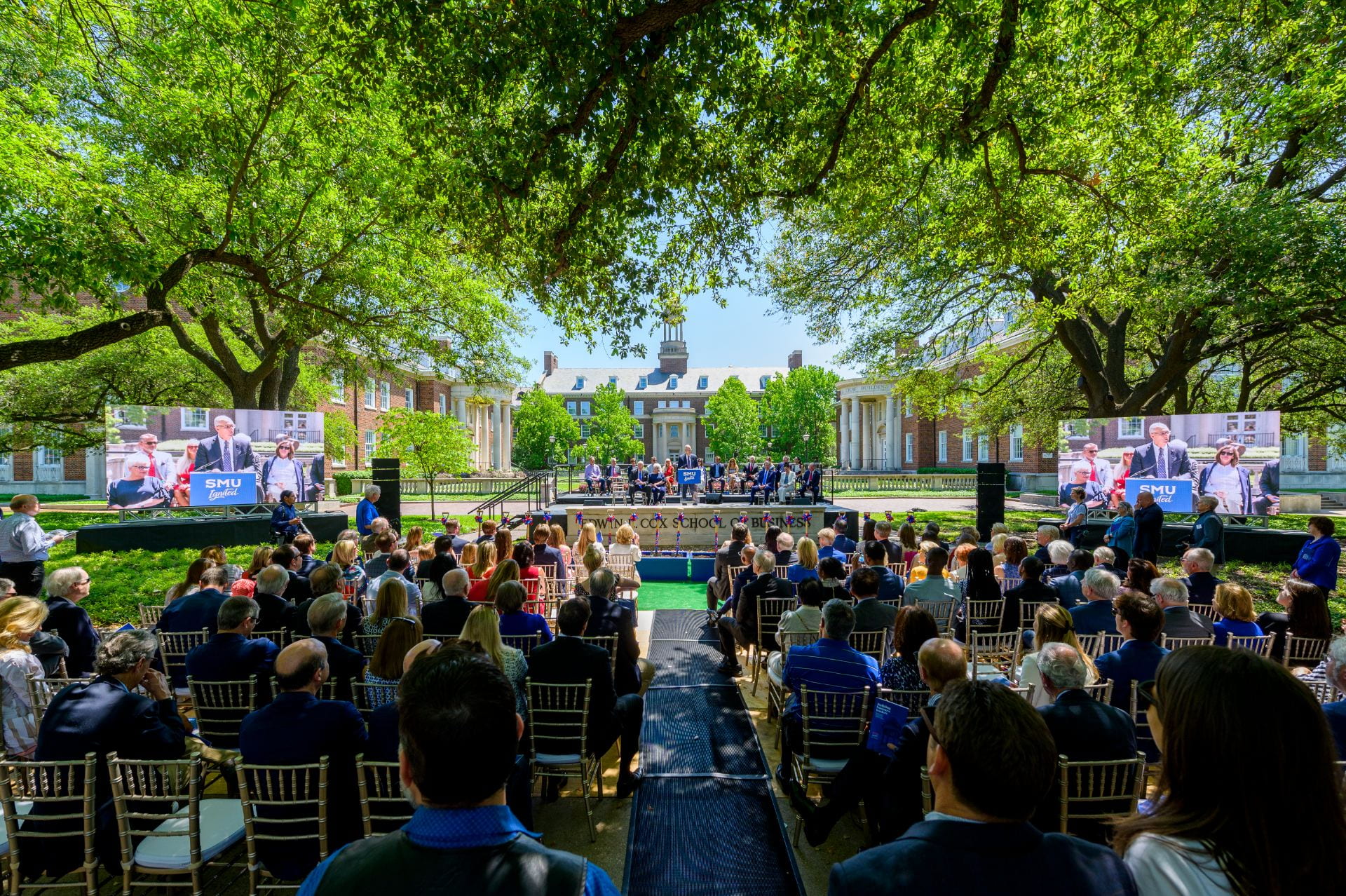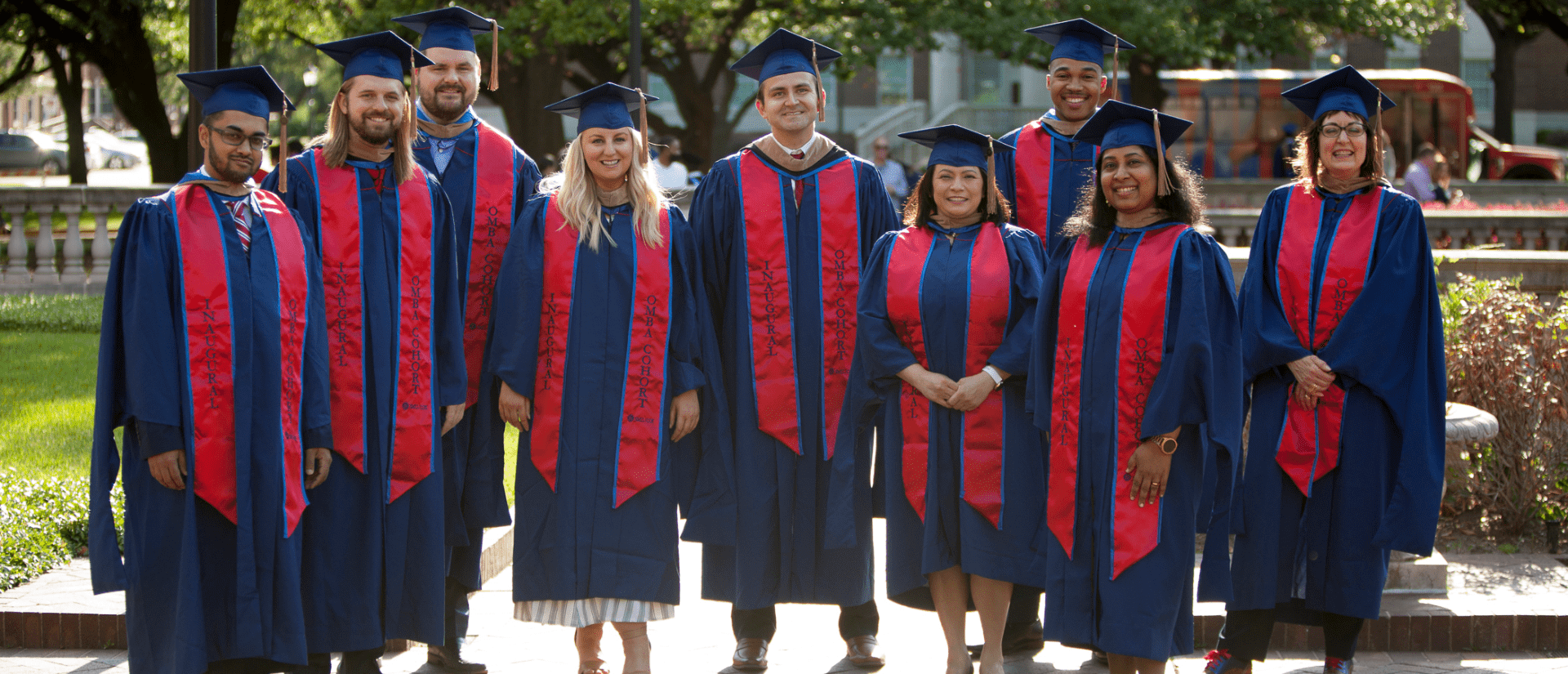In Kelvin Beachum’s view, the most effective leaders are those who first take the time to serve others in their organization and who first learn to be strong followers. The dual-degree SMU graduate and current Arizona Cardinals offensive lineman explained to an audience at Frances Anne Moody Hall that many of the most revered figures in the alpha-male world of the National Football League (NFL) are men who speak quietly, care for the welfare of their colleagues and embrace a slow, steady path to excellence.
“Servant leadership is something that we don’t talk a lot about,” Beachum told Cox Associate Dean Shane Goodwin, who moderated the discussion for Cox’s Leaders on Leadership speaker series. “Serving [others] in your leadership really provides the connective tissue in and around the organization that really propels the organization forward.”
Servant Leadership in Action
Beachum offered Dan Rooney III, the great-grandson of legendary Pittsburgh Steelers owner Art Rooney, as an example. Born into perhaps the most influential lineage of NFL owners, Dan Rooney nonetheless learned the family business from the ground up.
“He was a ball boy,” Beachum said. “He was in the equipment room learning how to clean clothes. He went into the scouting department, went into sales, literally took the steps that were necessary to become the leader eventually.
“Within a football team, there are a lot of egos,” Beachum continued. “It is a male, alpha-dog type of room. That’s just what it is. How do you find ways to galvanize all those type-A personalities to be able to move forward in a common goal?”
Beachum’s appearance capped the first year of Leaders on Leadership, in which celebrated professionals in their fields discuss their philosophies of leadership with students and the general public.
Other speakers on the inaugural slate included Troy Aikman, the three-time Super Bowl winning Cowboys quarterback; Patrick Walsh, a retired four-star Navy admiral; and Whitney Wolfe Herd, the founder of Bumble. The series will return next year, again under Goodwin’s facilitation.

From Small-Town Texas to the NFL
Beachum grew up in Mexia, Texas, a town of about 7,000 people 40 miles east of Waco. For college, he chose SMU, a quick 90 miles north on I-45. He graduated with two degrees from SMU—a Bachelor of Arts in economics and a Master of Liberal Studies—before entering the 2012 NFL Draft, where the Steelers made him sixth-to-last overall pick.
He keeps a close eye on his draft class. “I keep up with that list on a regular basis,” Beachum said, jokingly. “I wanna be the last one standing, and I’m gonna be the last one standing.”
In the 12 seasons since, Beachum has surpassed expectations, playing in 163 games and starting 149, on the offensive lines of the Steelers, the Jacksonville Jaguars, the New York Jets and, for the past four seasons, the Arizona Cardinals. In 2018 and 2021, he was nominated for the Walter Payton Man of the Year Award, the league’s highest honor and way of acknowledging great off-the-field accomplishments in community impact.
In 2016, Beachum launched an initiative called Kelvin Konnects to provide access and opportunity for minority students within STEAM pathways.
In his hometown of Mexia from 2016-2018, Kelvin Konnects held an annual three-day program aimed at introducing students to hands-on STEM fields and brought STEM education opportunities to the Barack Obama Male Leadership Academy, a magnet secondary school in Dallas. He also dedicates his attention and resources toward ending hunger and improving access to clean water.
Beachum credits his family for introducing him to a life of service and leadership. His grandfather was a pastor; his grandmother taught Sunday school. In Mexia, his father served on the city council and his mother on the school board.
When Beachum started at SMU, his first goal was to make enough money that his parents one day could decide if and when to retire. Watching his grandfather and father work on cars every day helped stoke his interest in technology and engineering.
Asked what he would tell athletes and other students about how to manage their careers, Beachum returned repeatedly to the twin themes of building relationships and tending to your roots.
Tackling the Hard Conversations
His master’s studies in organizational dynamics at SMU under Dr. Charlotte Barner prepared Beachum for a volatile period in the NFL early in his career.
In 2016, many players—most famously the San Francisco quarterback Colin Kaepernick—began a practice of kneeling before games to protest ongoing police violence against Black Americans. The question of whether and how to join these silent protests was a live-wire question within all 32 NFL teams, especially in a league where the majority of players are Black and team owners have always been overwhelmingly white.
It was a moment that tested would-be leaders in locker rooms throughout the league, Beachum said. “As players, are we gonna kneel? If we’re gonna kneel, are we gonna kneel together?”
The answers required a respect for many people’s backgrounds, values and professional risks. And an understanding that their conduct in the moments before kickoff would be judged, rightly or wrongly, in part on whether they could also win games.
“You really saw who was willing to handle some of those hard conversations and who kind of shied away from those things,” Beachum said. “Those are hard, real-time, real-life, societal kinds of conversations.”
Leading Through Relationships
What got him through that period, he said, were the quality relationships he had built with his teammates—during downtime, in cold tubs, without the demands of their phones or other agendas. That period prepared him to step into high-responsibility roles with the players’ union, as well as in his other endeavors.
“Leadership is a relationship business,” he said. “When I build a relationship, I’m able to understand what it is that they want, what it is that they want to accomplish, what it is that they want to aspire to be.”
Anyone with high aspirations has to master the arts of time management and prioritization, Beachum said. He’s a fanatic about filling his time with as much as he can, whether that’s grabbing a quick call to his family between meetings or getting a chiropractor to meet him in a parking lot to work on his joints and muscles for a few minutes as he works to extend his career in a high-impact position.
“You have to be obsessed with your time,” he said. “You have to own your time and be strategic in how you use your time. There used to be a time when I did hour-long calls. [But now] if I can’t get a conversation done in 15 minutes, me and you should not be talking at this point. I’ve got to stay on schedule.”
For young athletes, attending college in the new era of huge, sudden NIL (name, image, likeness) paydays and almost frictionless transfers between universities, Beachum offers a different sort of counsel: Slow down. It’s the only way to connect with other people deeply in ways that will pay off in the years ahead.
“What I struggle to understand with young people who are jumping in and out of the portal right now is, when you’re done playing the game, who are you going to be aligned with?” Beachum said. “If you go to four schools, what alumni network are you gonna be part of? As young athletes, lay roots and go deep somewhere. When you give to that ecosystem, that ecosystem will give to you.”













